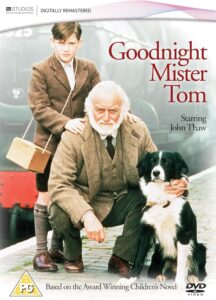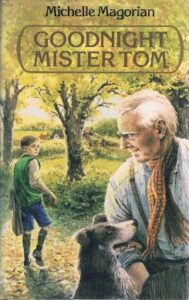Michelle Magorian’s much loved novel about a gruff old countryman and a traumatised, abused little evacuee and how they healed each other, was published in 1981. It was first introduced to me by a vistising speaker on a Kent English teachers’ resididential course the following year. She described it as “very perspicacious” and told us to go back to our schools and share it with our students. So I did – having bought a copy from the course book table and read most of it in bed late at nights during the rest of the course. I read it with classes, recommended it for independent reading and lent my copy to so many people that it should have fallen apart long since. Actually, it’s still intact – warmly tatty and evidently well read. A happy book.
A very bright Oxford-bound sixth form student once told me it was the best book she had ever read. And I’ve never met anyone – child or adult – who didn’t warm to it. There are lots of reasons for that but one of them is that, although Goodnight Mister Tom was published by Puffin and marketed as a children’s book, it isn’t really a “junior” title. It deals sensitively with issues such as mental health, child abuse, death and bereavement among many other things but it’s richly optimistic and positve. It’s a book for everyone in every sense.
The TV film starring John Thaw in 1998 brought the novel to the attention of even more people although Thaw as Tom – good as he was as an actor – failed to get the gritty gravelliness right. I’ve seen David Wood’s fine stage adaptation several times too. Again Oliver Ford Davies is excellent in some roles but his Mister Tom was too elegant and mannered. David Troughton (whom I interviewed about it at the time) came closest in the production at Open Air Theatre, Regent’s Park. His Tom was rough, raw and convincing.

Rereading the book now, I’m struck afresh by several things. First there’s the mystery of William’s mentally ill mother. We see her behaviour but there is no other explanation or label. She clearly has religious mania which is a recognised psychiatric condition. And both William and his infant sister are appallingly abused (aptly contrasted with the happy families of Little Weirwold) At the same time she has produced (at least) two fatherless children and is regarded with moral suspicion by her neighbour. William is suprised when Tom gives him bacon because at home that’s just for “lodgers and visitors”. The subtle inference is that she is working as a prostitute because she apparently (no welfare state in the 1930s) has no other source of income. Then eventually there’s her suicide as William begins to grow up and tries to reconcile her anomalies. She is certainly very ill – and a danger to everyone around her.
Second, this novel confronts death head on. It’s war time. Lovely Mrs Hartridge’s husband (and father of her new baby) is missing presumed dead. Several of the families in the village see their sons conscripted and some receieve the dreaded telegram which leads to the younger children coming to school red eyed and wearing black armbands. Radio news gets ever worse. Moreover, William is hit towards the end of the novel by a dreadful loss and Magorian’s presentation of his grief and healing process is arrestingly moving.
Third there’s the character of Zach, the child of actors, irrepressible and hilariously articulate beyond his years. He too has been evacuated to Little Weirwold. He’s “not a Christian” – an unheard of thing for William and the village children. Zach is Jewish and that’s nicely done too as, always ebullient, he just becomes part of the group. He’s charismatic and fun (probably tiresome to manage in school!). Of course the Jewishness is not an issue with anyone except William’s tragically bigoted mother when she hears about their friendship.
Fourth, I’ve always thought that Goodnight Mister Tom is a loose reworking of Silas Marner and have encouraged older students to read the two novels comparatively side by side. Tom is a lonely figure. He lost his young wife and the baby she had just given birth to, forty years earlier (cf Silas losing the respect and trust of his church community and thus his faith) which has left him introverted and unhappy. It is the arrival of William which forces Tom to emerge from his reclusiveness and help the boy, just as Silas does Eppie. There is a lot to Tom which the reader isn’t expecting at the start too. He’s clearly literate – books on the side, newspapers and he can retell bible stories from his own imagination as well as sharing read-aloud books with Willie, whom he teaches to read and write. Later he turns out to be a lapsed church organist too – and is persuaded to return to it when the regular orgainist goes to war. And my goodness, he’s feisty, determined and decent – the trip to London to find William took my breath away as it has done every other time I’ve read this compelling book.

And don’t forget Sammy. Until William’s arrival, Sammy was Tom’s only companion. He’s a dog small enough to pick up, plays a big part in helping William back to health both on his first arrival and after the London disaster and it’s Sammy who finds William at the very dramatic moment that he most needs it.
Magorian loves the 1940s : the setting for most of her books. Goodnight Mister Tom was her first and has been phenominally successful. Several others have been good and enjoyable (I particularly liked Back Home, for example) but none of her books has come anywhere near the popularity of Goodnight Mister Tom. Read it if you haven’t, or reread it to remind youself, and you’ll see why.
Next week on Susan’s Bookshelves: Lace by Shirley Conran